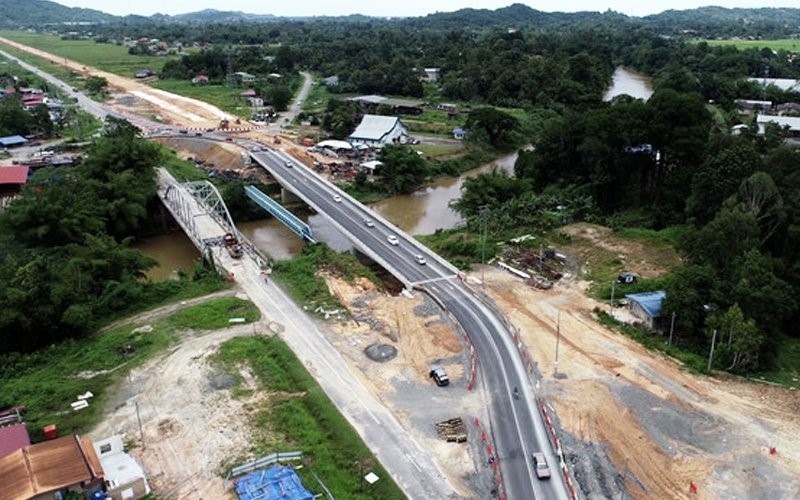
KUALA LUMPUR: A research arm of a leading bank believes that no new taxes would be introduced in the 2022 budget due to the lingering Covid-19 pandemic
MIDF Research, the investment arm of MIDF Amanah Investment Bank Bhd, however, said the government may need to increase borrowings to finance the widening fiscal deficit, which is expected to grow to 6.5-7.0% of the gross domestic product (GDP) in 2021 from the 6.0% projected earlier this year.
“We don’t think it is the right time for the government to introduce any new tax in 2022 because there is still uncertainty surrounding the Covid-19 situation, locally and globally, which could affect Malaysia’s economic growth stability.
“However, the government may need to increase borrowings to finance the (widening) fiscal deficit.
“A possible increase in the statutory debt ceiling to 65% of GDP from the current 60% will provide greater fiscal space for the government,” its economist Abdul Mui’zz Morhalim told Bernama when asked to share MIDF Research’s Budget 2022 wish list.
On fiscal management, he said the research team expects the government to keep its commitment to improve the fiscal position in the medium term, as the size of fiscal deficit to GDP is expected to be reduced to between -3.5% and -3.0% by 2025, as outlined in the 12th Malaysia Plan (12MP).
“According to the pre-budget statement, the government is considering introducing the Fiscal Responsibility Act, which we expect will promote fiscal discipline and improve the government’s procurement and debt management.
“This may include reviewing and introducing a new tax system to improve the government’s revenue generation in the future.”
He said improvement in the fiscal position would be crucial to ensure the government has greater fiscal flexibility to support the economy, especially to cushion the impact from the next economic crises.
Allocations for connectivity, infrastructure-linked activities
On investments, Mui’zz said the 2022 budget was likely to focus on connectivity and infrastructure-linked activities; hence there would be allocations for development spending and investments to improve these two sectors.
“This can be positive to attract more (foreign) investments to Malaysia,” he said.
For digital and technology infrastructure, he said the government was expected to focus on widening the broadband coverage, increasing the speed of mobile broadband services, enhancing the 4G network and promoting the adoption of 5G technology.
In terms of transport infrastructure, Mui’zz noted that since a list of highway and railway projects were mentioned in the 12MP, MIDF Research expected that they would also be featured in the 2022 budget.
“In addition, the government also indicated plans to develop a more efficient domestic logistics sector,” he said.
Among the projects mentioned in the 12MP are the Klang Valley Double Tracking (KVDT), East Coast Railway Link, Pan Borneo Highway, West Coast Expressway and Central Spine Road
Overall, Mui’zz said MIDF Research expected investment promotions to be guided by the National Investment Aspirations (NIA) policy that focuses on attracting quality investments to create more high-paying jobs in Malaysia.
“We believe that the continued investments in infrastructure will be initiatives that will revive growth in the economy, as increased activities in the construction sector will have positive spillover effects on other sectors in the economy,” he said.
Mui’zz did not rule out the government considering an increase in the allocation for healthcare and the Covid-19 Fund for next year, as the waning effects of the existing vaccines may require additional jabs and there is still a chance of resurgence of Covid-19 cases with the emergence of new variants of the coronavirus.
Financial assistance for B40 to be continued
To assist those who have been hit hard by the pandemic, he said the research team believed that the 2022 budget would continue to offer financial assistance for the less privileged, especially the bottom 40% income (B40) group as well as those who have lost their jobs and may have even fallen below the poverty line.
For the business community, Mui’zz said MIDF Research expected more support in terms of grants, financing schemes and training programmes to be provided in the upcoming budget, especially for the micro, small and medium enterprises (SMEs).
The fiscal assistance is expected to promote higher domestic spending by consumers and business enterprises, he said.
Meanwhile, he noted that measures to improve the labour market may be included in the budget as the recovery in the job market had been sluggish and was also impacted by the full lockdown from June 1-14 this year.
“Possible measures include incentives for hiring and training, extension of the wage subsidy to protect jobs, and support for the gig economy and informal employment.”
The 2022 budget will be tabled in Parliament on Oct 29.
Source: https://www.freemalaysiatoday.com/category/highlight/2021/10/03/budget-2022-no-new-taxes-expected-says-research-group/

